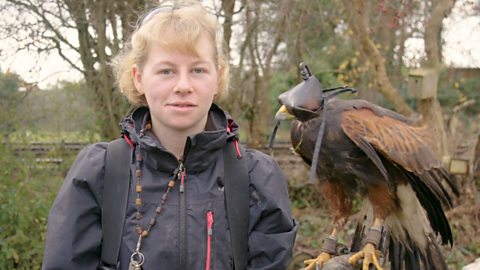Meet Evie, 22, from Buckinghamshire. Find out about her life as a horse riding instructor. Part of our Bitesize world of work series.
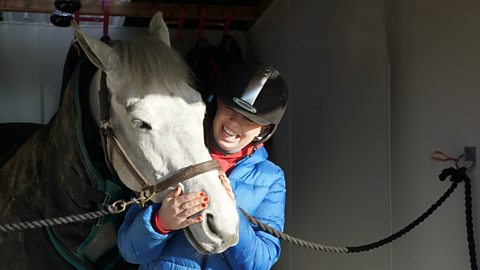
I am a very lucky person that my hobby and passion in life has turned into a career. This is what keeps me going though the long days when I am stood out teaching in the dark in the middle of winter in minus temperatures.
What is your job?
I teach people how to ride a horse and how to look after horses. I teach people who feel like they are failing at the sport and like they are not good enough and I build them back up from the basics. I have people who fall off 10 times in one lesson, because their pony is so naughty, but they don’t want to give up them, so we carry on.
My first priority is my own horse, then I look after up to three other horses. I also help new ponies to settle in the stables. I muck them out, feed them, exercise them, and turn them out into the fields in the afternoon.
During the day, I exercise other horses. People may call me with a problem with their horse and I help them – I'm like their equine 999. I have clients who have taken on young ponies who have no life experience, so it is a learning process for both pony and rider. I try to teach people that a pony's education is the most important thing and can have a massive impact on the rest of its life. During term time I teach people after school. In summer I do summer camps and get people ready for big competitions.
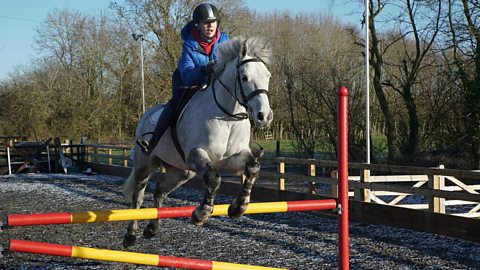
What skills do you need in your job?
Communication, both with humans and horses. With a horse you need to see how they look and how they are behaving – you have a giant toddler who can’t talk. If a horse is unwell, they can go downhill quite quickly, so you must be able to tell if they are happy or in pain. If people are scared on their horse, you need to help them stay calm as their emotions affect the horse.
You have to be patient. You have to be able to change your teaching style to suit peoples age, ability and personality. Because I am dyslexic, I can explain things in different ways as I think about things differently. If someone doesn’t understand something I can step back and think about what other words would help them understand. I find that easy to do.

What subjects did you study at school?
I did PE at A-level. It taught me about fitness, so I understand things such as how to get a horse fit, how quickly horses recover and the importance of using ice to help horses' legs to recover after exercise.
At A-level I did Biology, PE, and Business, but I also did cooking and my British Horse Society Stage 2. I've also done all my Pony Club Tests and my British Horse Society Stage 3. Legally you don’t need any formal qualifications to teach riding but I have done quite a few, including my Pony Club teaching qualification and the UK Credited Coaches Level 2 qualification.
Is this the job you always wanted to do?
No. I’ve ridden since I was young, but I trained to be a chef at school. I worked for my mum who is a cook, but then I was asked by my riding instructor if I could help with pony club camp and it has snowballed into a full-time job. It was not planned.

Top tips
- Pick up as much knowledge as you can. During your holidays work in the yards, help with events
- People want to know you are trustworthy and they can leave you with a horse and you can look after it
- You have to be strong and believe in your skills and ethos. It is a tough job, in a tough industry and you can only come out the other side if you stick to it with a passion. Then you earn the respect you need as it is a unique industry that mainly runs on reputation.

What to expect if you want to be a horse riding instructor
- Horse riding instructor average salary: ÂŁ14,000 to ÂŁ25,000 per year.
- Horse riding instructor typical working hours: 36 to 38 hours per week.
What qualifications do you need to be a horse riding instructor?
You could get into this role via a college course (such as a Level 2 certificate, Level 3 Diploma or a T-level in Animal Care and Management - England-only, from Sept 2023), an apprenticeship, or specialist courses run by professional bodies such as The British Horse Society (BHS) or The Association of British Riding Schools (ABRS).
Sources: LMI for All, National Careers Service,
This information is a guide and is constantly changing. Please check the for the latest information and all the qualifications needed and the for more on T-levels.
For careers advice in all parts of the UK visit: , , and .

Lucy: vet
Lucy uses her knowledge of Biology in her job as a vet.
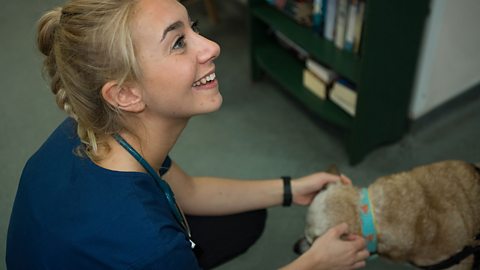
How I turned my hobby into a career
Find out more about Megan's journey.
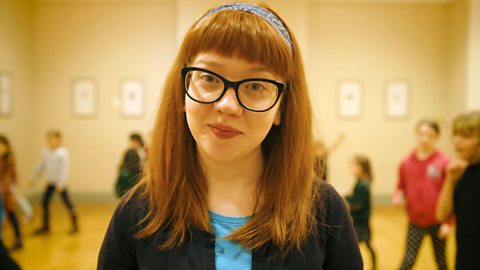
Florrie: bird of prey specialist. video
Florrie runs her own falconry business.
